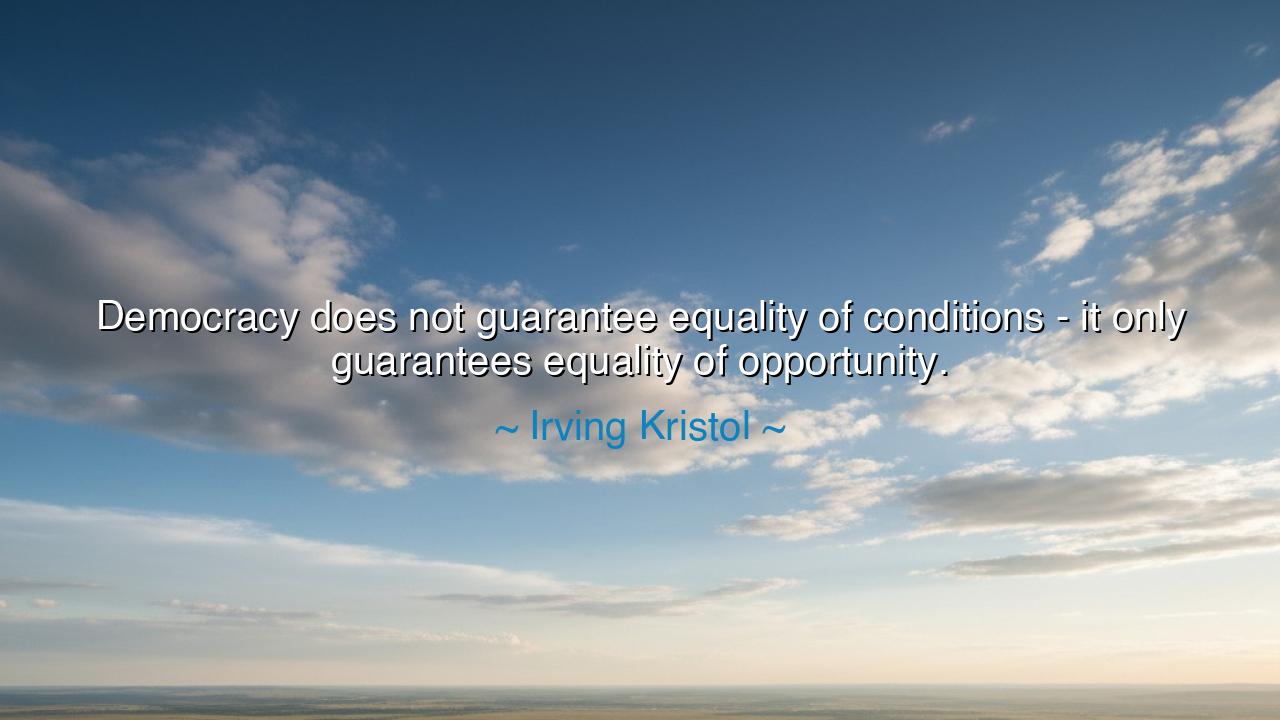
Democracy does not guarantee equality of conditions - it only
Democracy does not guarantee equality of conditions - it only guarantees equality of opportunity.






"Democracy does not guarantee equality of conditions – it only guarantees equality of opportunity." Thus spoke Irving Kristol, a voice of modern political thought, unveiling a truth that has echoed through the ages. His words remind us that democracy is not a promise of sameness, but a promise of freedom. It does not say to all men, “You shall have the same,” but rather, “You shall begin with the same chance.” In this distinction lies the soul of liberty, for to confuse equality of conditions with equality of opportunity is to misunderstand the purpose of a free society.
The origin of this wisdom flows from the struggles of humanity to rise from tyranny into freedom. In kingdoms of old, birth was destiny: the noble was born to privilege, the peasant to toil. No matter the strength of the mind or the fire of the spirit, the walls of class were iron. But when democracy dawned, it shattered those chains, declaring that each man and woman may walk their own path, that their future should not be bound by the accident of birth. Yet Kristol, with clear eyes, reminds us that while the gate is open, the road remains long and uneven. Some will rise high, others will fall low, not by design of the state but by the fate of human effort, talent, and chance.
Consider the tale of Abraham Lincoln, born in a log cabin, poor and uneducated, yet destined to become one of the greatest presidents of the United States. Had he been born in a land where conditions were guaranteed equal, he may have been stifled by the limits of imposed sameness. Instead, democracy gave him opportunity, though not comfort; freedom, though not ease. With hunger for knowledge, with persistence in law and politics, he climbed from poverty to power, shaping the destiny of a nation. His life is proof of Kristol’s words: equality of opportunity can lift even the humblest to greatness.
But contrast this with the false promises of systems that sought equality of conditions—where wealth, status, and outcomes were made uniform. In the twentieth century, such dreams gave rise to societies where ambition was punished, where excellence was leveled, where innovation died. The result was not harmony, but stagnation; not liberty, but servitude. For when men are told their efforts will earn no greater reward than the idleness of others, they cease to strive. Democracy, in refusing to guarantee equal conditions, preserves the fire of endeavor, the dignity of struggle, the hope that each may rise according to their gifts.
This teaching is not without sorrow. For if opportunity is open, yet the paths of society are strewn with obstacles—poverty, prejudice, and ignorance—many will still stumble. Thus Kristol’s words are not a call to indifference, but a call to vigilance. For the task of a just people is to ensure that opportunity is real, not illusory—that education, justice, and fairness open doors to all, so that none are barred at the beginning. The state cannot promise the same outcome for all, but it must guard against gates closed by injustice.
The lesson, therefore, is profound. Cherish democracy not as a giver of rewards, but as the keeper of chances. Do not look for equal conditions, for they do not exist in nature; the tree does not grow like the stone, nor the river flow like the sky. Instead, seek to protect the equal chance to plant, to build, to dream. Then each man and woman may rise by their own effort, their own courage, their own will.
What practical steps must we take? We must labor to keep education strong, that the children of rich and poor alike may have a fair beginning. We must guard against corruption, which tilts the field and strangles true opportunity. We must honor merit, reward diligence, and inspire ambition, for these are the engines of a thriving people. And in our hearts, we must learn compassion, to lift those who stumble, not by robbing others, but by offering them another chance.
So let Kristol’s words be remembered: democracy is not the promise of equal results, but the promise of equal beginnings. It is the soil, not the harvest; the gate, not the journey; the dawn, not the noon. Let us keep the soil fertile, the gate open, the dawn bright—and each life shall write its own story upon the earth.






AAdministratorAdministrator
Welcome, honored guests. Please leave a comment, we will respond soon